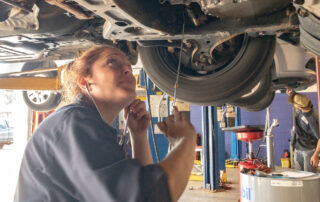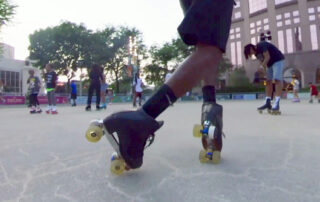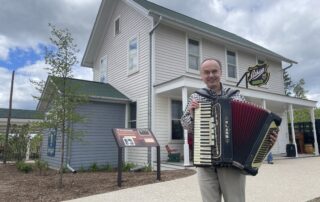Milwaukee’s Islamic Da’wah Center is a place for faith and fellowship. For Brother Will Perry, it helps him stay focused on what’s important.
“Here you find Muslims from all over the world that come here to worship, to learn about their religion, to practice their faith,” Perry said.
Perry spent almost three decades as a Milwaukee firefighter. After retiring in 2006, he accepted an offer to become the Dawah Center’s Executive Director.
“I’m kind of on that other side of the hill right now,” Perry said, “I’ve got to be thinking about, you know, what do you leave behind?”
He’s left a legacy of service. He helped the center start a weekly food pantry.
“One of our creeds is to feed other people, regardless of who they are and where they’re from, so we began the food pantry in 2007 out of my minivan,” Perry said.
It’s grown from a small pantry out of a minivan to something much larger. Every week, the parking lot in front of the Da’wah Center becomes a bustling hub of activity with truckloads of food, dozens of volunteers and cars lined up down the street. As cars pull up to the entrance, a volunteer loads the car with a box full of food.
“We touch hundreds of people every single week, and it’s had a significant impact on the quality of life for a lot of people,” Perry said.
The Da’wah Center works with several community partners including Feeding America and Amazon to help meet demand. Perry says they give away more than 10,000 pounds of food a week, curbing hunger for everyone in this north Milwaukee neighborhood.
“It doesn’t matter whether you come here to worship or not, it’s our duty to be of service and that’s what we do,” Perry said.
This isn’t the only Da’wah Center program making a difference. A few blocks from the mosque, the Ibrahim House is an apartment building that serves as a living space and reentry program for those leaving incarceration.
“They come out and we are holding their hands and helping them through the process of reentry back into society,” Perry said, “They get their own apartment, eventually get their own house and they contribute back to the community here.”
James Watkins spent more than two decades in prison. The programs and support offered at the Ibrahim House helped him chart a new path.
“When you get out, you can have a job. You can go to school, but housing is hard,“ Watkins said.
He went back to school and now has a career facilitating classes at Marquette University.
“It was a long road, but I had support, like I had Brother Will,” Watkins said, “He constantly talked to me. He constantly encouraged me. He constantly supported me, you know?”
For Perry, it’s all part of a life of faith, service and community.
“Food pantry, prison reentry, education, community service, working with religious and non-religious entities in our community, that’s all part of worship too,” Perry said, “I don’t see myself going anywhere else or doing anything else. This is pretty much it.”
This work is part The Wisconsin Muslim Project from PBS Wisconsin, a project supported by the Doris Duke Foundation through the Building Bridges Program. The mission of the Building Bridges Program is to support national efforts, working with U.S. Muslims, to increase mutual understanding and well-being among diverse populations for the benefit of building stronger, inclusive communities.







